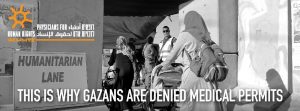In recent years, PHRI has submitted several freedom of information requests to COGAT. The responses have been persistently lacking, riddled with missing or partial information. The RIC report revealed a policy of red tape and a lack of transparency with respect to data collection at COGAT. The report reveals two key issues:
Lack of transparency with respect to reasons for denial
The most commonly listed reason for denying applications made by Gaza and West Bank residents for medical treatment outside their area of residence was listed as “other”. In Gaza, 90% of rejected applications between 2016 and 2020 were denied under the classification of “other”. In 2020, the number was even higher; 93% of refusals were listed as “other”. A similar pattern was observed in the West Bank figures.
Listing “other” as the reason for application denials is a non-transparent practice that hinders external evaluation of how the permit regime works. It is worth noting that the rejection letters received by the patients themselves normally do list a reason for the denial; therefore, this points to an inconsistency in COGAT’s data collection and/or documentation.
Denials on the grounds that treatment is available in the patient’s area of residence
Palestinians in need of treatment outside the Gaza Strip may apply for a permit only if the treatment sought is “life-saving or crucial to the quality of life” and unavailable in Gaza. Figures provided by COGAT show that between 2016 and 2020, at least 1,500 patients from Gaza were denied permits on the grounds that the treatment was available to them locally.
Based on PHRI’s monitoring of such cases, we have observed that COGAT rejects most of these cases on the basis of incorrect information, and contrary to the professional opinion of the local physicians. There is a lack of transparency in regards to COGAT’s decision making and determination process concerning the availability of treatment in Gaza.
For instance, PHRI has documented many cases in which COGAT presented details of a specialist doctor or medical center in Gaza as proof that the treatment was indeed available locally. However, when PHRI reached out to the doctor or institution in question, we were told they could not provide the essential treatment. In practice, this tedious bureaucratic process delays the provision of medical treatment unnecessarily.
The RIC report exhibits a pattern of extraneous interference with the functioning of the Palestinian health care system by Israel, and a lack of transparency that conceals the effects the permit regime has on the everyday lives of Palestinians living in the oPt.
Sincerely,
Arel Jarus-Hakak
Projects and Research Coordinator
Palestinians in the OPT & The Mobile Clinic Department
Physicians for Human Rights Israel (PHRI)

 The latest news
The latest news